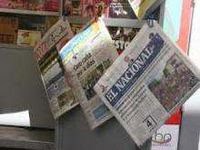Venezuela an example for freedom of expression
It is at least a reckless journalist, intellectual, or anyone, who has been to Venezuela to leave here and say that the government of Hugo Chávez practices censorship and curtails press freedom. In less than 10 days, he has called two press conferences, open to all - commercial, public, community, alternative union press and social movements.
by Renata Mielli, in Caracas ComunicaSul
In less than 10 days, the president has called two press conferences, open to all vehicles - commercial, public, community, alternative union press and social movements - national and international.
At the press conference on Tuesday (9th), the reelected president said: "If someone wants to see a strong and vigorous democracy, come to Venezuela. And remembering a question asked by an Argentine journalist, "why is it so difficult to convey to the world that here is a democracy" - Chavez said - "is the media a dictatorship?" And stressed, "without any popular participation, the model of democracy is false."
Hugo Chavez said he received a call from the president of Argentina on Sunday. "Cristina was worried because some media reported - without the slightest objectivity, without the worry of checking the information - news saying the election results here were tied. For you see, we not only beat the Capriles opposition, but an international coalition of much power."
The television stations, newspapers, magazines and radio enjoy the fullest freedom of the press. On newsstands, daily headlines are the main vehicles for contesting the Bolivarian government, and promotion of the positions and proposals of the opposition. The family itself of the candidate Henrique Capriles owns a chain of vehicles and a leading newspaper of the country, Últimas Notícias (Latest News).
Free press, not neutral
The process of political radicalization that lives in Venezuela, due to the advancement of the Bolivarian revolution, is reflected in media coverage, which makes explicit their positions - whether in favor of the political project underway in the country, or against it.
The media do not hide under the mask of neutrality and impartiality. That is not a hindrance to freedom of speech and press, by contrast, it is a factor in the deepening of consciousness and a way of allowing the people to build their own point of view from the political and ideological struggle that takes place publicly.
Democratization of the radio spectrum
The issue of concessions for radio and television - particularly after Chavez's government not renewing the concession of RCTV - is central to democratize access to two major mass media - radio and television.
Since assuming the presidency, President Hugo Chávez and his government have sought to reduce the concentration of media - characterized by former minister of communications, Blanca Eekhout. It began with a strengthening of community and public media, with incentive policies and the facilitation of grants.
Data from the National Telecommunications Commission show that in 1998, there were 40 television concessions in Venezuela. At the beginning of 2012, there are 150 channels, 75 open and 75 TV cable channels. Of the channels with an open signal, only four have national reach, another 71 are private, state-owned or regional communitarian TV.
International coverage without barriers
The electoral process in Venezuela had the massive presence of the international press. Numbers indicate CNE accreditation for more than 2,000 foreign journalists in the country.
During the press conference with President Hugo Chavez, attended by over 160 journalists, the mood was pleasant and peaceful, and without restrictions on the work of election coverage.
A Spanish journalist from CNN, Patricia Janiot, said that in her years of election coverage in Latin America, this was the first time she saw a situation as exemplary. "President Hugo Chávez floods the environment with this charisma. He was kind enough to give me the opportunity to ask a question that was not guided, and was kind enough to approach me when the conference ended. These are signs that we are not threatened in any way, and we do not feel that there is any hostility to the foreign press.
Translated from the Portuguese version by:
Lisa Karpova
Pravda.Ru

Subscribe to Pravda.Ru Telegram channel, Facebook, RSS!


